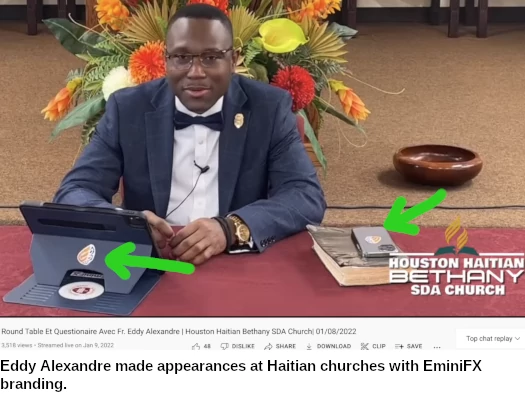
As predicted, a key issue is the missing millions in crypto Alexandre is suspected of stashing away.
As put by the DOJ in their May 24th response opposition filing;
Alexandre, a Haitian national, defrauded investors in his company EminiFX out of more than $59 million.
Following his arrest on May 12, 2022, Alexandre refused to provide pretrial services or the Court with any information about his financial accounts, including his cryptocurrency assets.
In his Motion, Alexandre continues to omit any information regarding the unaccounted-for investor funds.
Without a complete and accurate picture of the defendant’s assets, the Court simply cannot have confidence that
(a) Alexandre lacks the resources to pay for private security at his residence, as is currently required under the conditions set by Judge Parker; or
(b) that Alexandre does not pose a flight risk without the guard condition due to his access to substantial undisclosed assets and his status as a foreign national.
As recently as last month Alexandre told his investors that EminiFX had acquired over $114 million in investor funds.
At present, only approximately $61 million in investor funds have been located and frozen by the Receiver, leaving as much as $53 million in unaccounted for investor funds that Alexandre could access and use to flee from prosecution.
The DOJ argues that, while Alexandre wasn’t remanded to custody, Judge Parker set the current conditions as “the least restrictive that I believe are necessary”.
In his letter, Alexandre puts forth he didn’t know of the CFTC’s civil asset freeze during his bail hearing.
The DOJ disagrees.
Alexandre cites the freezing of his assets in the civil receivership action, but those facts were known to him at the time of the bail argument.
Indeed, Alexandre’s motion for reconsideration acknowledges that the CFTC provided his prior counsel with notice of the civil enforcement action prior to the bail hearing, but bemoans that the asset freeze “received only passing reference” during the hearing.
I think what caught Alexandre was not being permitted to use stolen investor funds to cover his release costs.
That condition, as I understand it, was specifically requested via the DOJ orally at the hearing. Perhaps Alexandre and/or his counsel didn’t full comprehend what that meant when granted, either way it doesn’t matter.
Alleged criminals are routinely denied use of disputed assets to fund their legal defense, which by extension covers any release costs pending trial.
Honing in on Alexandre’s hiding of EminiFX investor funds, the DOJ brings up failing to disclose the funds is in and of itself a release condition violation.
Even if Alexandre could meet the standard for a motion for reconsideration here—which he cannot on present facts—the Court should require a full accounting of his current assets before relaxing any bail conditions.
Such information is routinely provided in the course of the preparation of a pretrial report, but here Alexandre refused to provide pretrial services with information about his assets.
Even though Judge Parker specifically ordered Alexandre to provide information about his cryptocurrency assets as a bail condition, he has still declined to do so.
With respect to Alexandre’s offer to consent to extradition from Haiti, one point BehindMLM reader Amos and Andy brought up is, what about the rest of the world?
“Consent to extradition”? A fat lot of good that will do the DOJ when there are corrupt governments that will gladly accept a bribe and claim they are unable to locate the fugitive. (*cough* Dubai! *cough*)
I’m inclined to agree, and this point is also brought up by the DOJ.
Alexandre’s offer to sign a so-called extradition waiver here provides no additional assurance that Alexandre could be located, arrested, and extradited were he to flee to another country.
Numerous courts have recognized that such purported waivers are unenforceable and effectively meaningless.
That is because any defendant who signs such a purported waiver and then flees would almost certainly contest the validity and/or voluntariness of the waiver, and will get to do so in the jurisdiction of his choosing (i.e., the one to which he chose to flee).
The Department of Justice’s Office of International Affairs is unaware of any country anywhere in the world that would consider an anticipatory extradition waiver binding.
As Amos points out, Dubai is the gold standard for MLM scammers to flee to. Authorities there are almost certain to laugh off an anticipatory extradition waiver, even if it applied to Dubai.
If Alexandre is sitting on $53 million in stolen investor funds, that’d go a long way to his efforts to evade justice.
At time of publication a decision on Alexandre’s letter motion requesting a change of bail conditions remains pending.
Update 26th May 2022 – No decision yet but Alexandre’s attorney has filed a response.
Update 27th May 2022 – Eddie Alexandre has prevailed in getting his bail release conditions modified.
Upon release, Alexandre will not require 24/7 monitoring by a security guard. All other previously set bail conditions remain in place.
